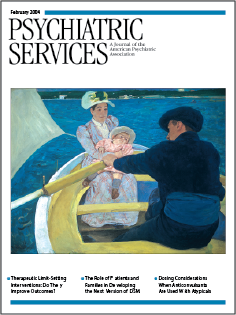Unethical to Speculate?
To The Editor: I thoroughly enjoyed the Personal Accounts column in the October issue (1). John Stuart Mill's description of the depths of his depression was most compelling and can be used to educate patients, families, and providers. The account also raises interesting points about spontaneous recovery from major depression and the psychodynamics of father-son relationships.
However, I was baffled when I read column editor Jeffrey Geller's comment: "I shall refrain from analyzing this case—to do so would be to violate the American Psychiatric Association's code of ethics." Intuitively it didn't make sense that speculating about the psychodynamics of someone long deceased would be unethical. And why would such a prohibition be applicable only to posthumous psychodynamic appraisals while Dr. Geller was comfortable assigning a retrospective diagnosis of major depression?
The relevant subsection of the APA's code of ethics (2) states the following:
"On occasion psychiatrists are asked for an opinion about an individual who is in the light of public attention or who has disclosed information about himself/herself through public media. In such circumstances, a psychiatrist may share with the public his/her expertise about psychiatric issues in general. However, it is unethical for a psychiatrist to offer a professional opinion unless he/she has conducted an examination and has been granted proper authorization for such a statement."
The code doesn't distinguish between patients who are alive or deceased. But I can't imagine that the intent is to preclude consideration of deceased historical figures. If so, then a vast body of literature about the psychopathology of long-deceased persons could be taken to be ethically deficient. Also, the requirement for direct examination and authorization would generally preclude future psychodynamic and other considerations of deceased persons.
The APA should consider revision of the ethics code if it continues to be interpreted in such a counterintuitive fashion.
Dr. Cohen is affiliated with the Brooklyn Veterans Affairs Medical Center.
1. 1.Mill JS: A crisis in my mental history. Psychiatric Services 54:1347–1349, 2003Link, Google Scholar
2. 2.Principles of Medical Ethics With Annotations Especially Applicable to Psychiatry. Washington, DC, American Psychiatric Association, 2001Google Scholar



